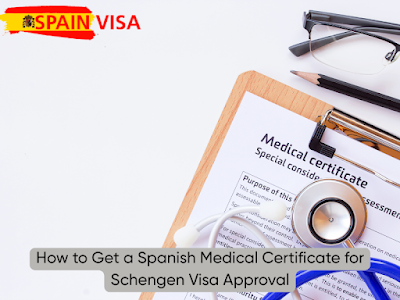How to Get a Spanish Medical Certificate for Schengen Visa Approval
Traveling to Spain is a dream for many, whether to stroll through Gaudí’s masterpieces, sip Rioja in La Rioja, or lounge under the sun-drenched skies of Andalusia. But before those dreams turn into Instagram stories, travelers from non-Schengen countries often face one vital hurdle: the Schengen visa application. Among the various documents required, the Spanish medical certificate stands as a crucial yet sometimes overlooked piece of the bureaucratic puzzle.
Understanding how to acquire a valid medical certificate for Schengen visa approval—specifically for Spain—is essential. This document is not only about proving health but also about complying with the specific legal and bureaucratic frameworks Spain enforces.
Why a Medical Certificate Is Required
At its core, the requirement stems from a desire to protect public health within the Schengen zone. Spain, like other EU states, requires visa applicants to demonstrate that they pose no significant health risk to residents and other visitors. For long-stay visas, such as student, work, or family reunion visas, a medical certificate becomes indispensable.
The certificate must confirm that the applicant does not suffer from any disease that could pose a threat to public health, particularly those listed in the International Health Regulations (IHR) of 2005.
Who Needs This Medical Certificate?
Not every applicant for a Schengen visa will be required to submit a medical certificate. Typically, the following categories must provide one:
-
Applicants for a residence visa (longer than 90 days)
-
Students pursuing long-term academic courses
-
Family reunification applicants
-
Employees and interns staying over three months
Tourists applying for short-term visas are generally exempt unless requested otherwise during their Spain Visa Appointment.
Where to Get a Medical Certificate for a Schengen Visa
The medical certificate must be issued by a licensed physician, preferably one recognized by the consulate or embassy handling the application. If applying from a non-EU country, it’s often best to visit a clinic experienced in handling visa medicals.
It’s crucial that the medical practitioner is officially registered and that their license is valid at the time of issuance. Some consulates maintain a list of approved or recommended doctors. Be sure to check with your local Spanish consulate prior to scheduling your medical appointment, especially well ahead of your Spain Visa Appointment date.
The Structure and Content of the Certificate
The certificate itself must include very specific wording. While the language may vary slightly depending on consular requirements, the standard declaration reads:
“This medical certificate certifies that [Applicant’s Full Name], passport number [XXXXXXXX], does not suffer from any diseases that may have serious public health implications, according to the International Health Regulations (2005).”
The document must:
-
Be printed on official letterhead
-
Include the doctor's full name, license number, and contact information
-
Be dated and signed by the physician
-
Be issued no more than 3 months before your Spain Visa Appointment
Some embassies may also require an official translation of the certificate into Spanish, so it’s wise to procure the certificate in English and have it translated by a certified translator if needed.
Legalization and Apostille
Depending on your country of origin, the certificate may need to be legalized or apostilled. This process authenticates the medical certificate so that it is recognized as a valid legal document in Spain.
-
Apostille: If your country is a signatory to the Hague Apostille Convention, your certificate must be apostilled by the relevant government authority.
-
Legalization: If not part of the Apostille Convention, you'll need to go through the full diplomatic legalization process, typically involving your foreign ministry and the Spanish consulate.
Don't overlook this step—many applications are delayed or denied due to improperly validated documents.
Timing and Logistics
Obtaining your medical certificate is not something to leave until the last minute. Clinics may take several days to schedule appointments, and the physician might need a day or two to finalize and sign the certificate. Adding time for apostille or legalization, plus translation if necessary, means you should begin this process at least four to six weeks before your Spain Visa Appointment.
Moreover, ensure the certificate is valid by the time you submit your visa documents. If it's dated too early, the consulate might ask for a new one—adding time, stress, and expense to your application.
Common Mistakes to Avoid
-
Incomplete information: The physician must include all details—name, passport number, date, and specific wording about IHR diseases.
-
Unsigned or undated certificate: These are invalid and will be rejected outright.
-
Outdated document: A certificate older than three months is typically considered expired.
-
Wrong physician: Ensure the doctor is certified and preferably recognized by the Spanish consulate.
-
Skipping the translation: If the consulate requires it in Spanish, an English certificate won’t suffice without translation.
Additional Tips for a Smoother Process
-
Confirm requirements on the official website of the Spanish consulate or embassy in your country. Requirements can vary slightly by location.
-
Schedule your Spain Visa Appointment only after securing the medical certificate—or ensure your appointment date gives you enough time to gather it.
-
Bring multiple copies of the certificate (original, apostilled, translated) to your appointment, just in case.
-
Store all your visa documents in an organized file, and double-check the consulate’s checklist before submission.
Final Thoughts
The path to Spain is paved with paperwork, and while the medical certificate may feel like a minor document, its importance is anything but trivial. In the eyes of the Spanish immigration system, it acts as a formal declaration of your fitness to enter, reside, and participate in life within their borders.
Approach this step with the same care and precision as you would your Spain Visa Appointment. By securing a correctly formatted, properly authenticated, and timely issued medical certificate, you're not just checking a bureaucratic box—you’re stepping confidently toward your new life, adventure, or academic pursuit in España.

.png)
.png)
.png)
Comments
Post a Comment